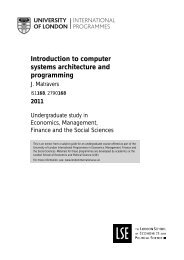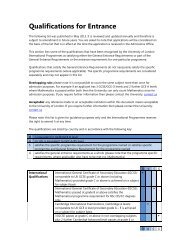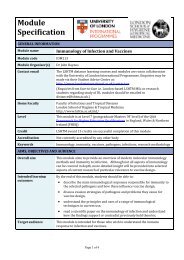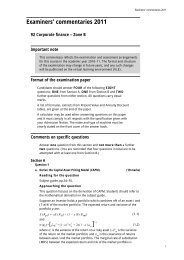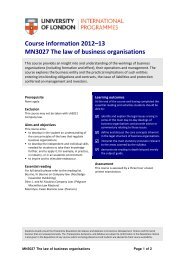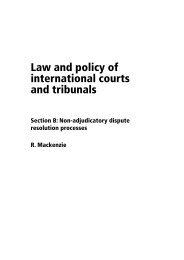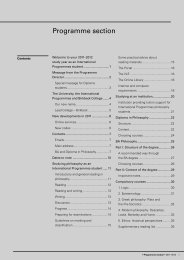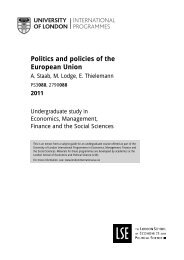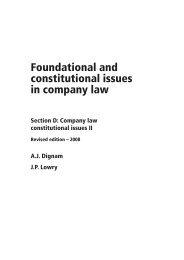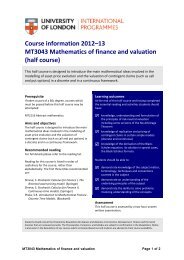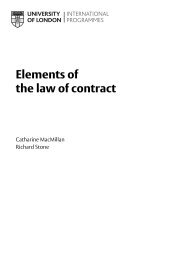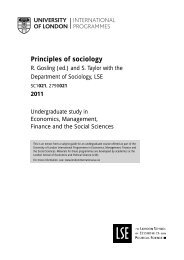Public law - University of London International Programmes
Public law - University of London International Programmes
Public law - University of London International Programmes
Create successful ePaper yourself
Turn your PDF publications into a flip-book with our unique Google optimized e-Paper software.
page 4 <strong>University</strong> <strong>of</strong> <strong>London</strong> <strong>International</strong> <strong>Programmes</strong><br />
the constitutional position. It is the constitutional rules that are <strong>of</strong> prime importance:<br />
the political and other factors that have an impact on the working <strong>of</strong> those rules, while<br />
<strong>of</strong> great significance, are ancillary.<br />
1.1.2 A constitution under reform<br />
The election <strong>of</strong> a Labour government in 1997 – after 18 years <strong>of</strong> Conservative Party rule<br />
– led to major constitutional reform. The incoming government’s agenda included<br />
devolution to Northern Ireland, devolution to Scotland and Wales, reform <strong>of</strong> the<br />
House <strong>of</strong> Lords, reform <strong>of</strong> the electoral system and the introduction <strong>of</strong> a Freedom <strong>of</strong><br />
Information Act. Of the greatest significance was the intention to incorporate into<br />
domestic <strong>law</strong> – under the Human Rights Act 1998 – most <strong>of</strong> the rights and freedoms<br />
protected under the European Convention on Human Rights. By 2002 much <strong>of</strong> the<br />
reform agenda had been accomplished: devolution to the nations had taken place, a<br />
Freedom <strong>of</strong> Information Act had been introduced, the Human Rights Act 1998 was fully<br />
in force and a partial (but not yet complete) reform <strong>of</strong> the House <strong>of</strong> Lords achieved.<br />
Reforms have been made to the electoral system, including a register <strong>of</strong> political<br />
parties and statutory regulation <strong>of</strong> donations to political parties. The Constitutional<br />
Reform Act 2005 reformed the <strong>of</strong>fice <strong>of</strong> Lord Chancellor and established a Supreme<br />
Court to replace the formerly highest court in the United Kingdom, the House <strong>of</strong> Lords.<br />
An inconclusive general election result in 2010 led to the formation <strong>of</strong> a Coalition<br />
Government made up <strong>of</strong> the Conservative Party and Liberal-Democrat Party. This has<br />
led to further constitutional reform. The Fixed-term Parliaments Act 2011 and the<br />
Parliamentary Voting System and Constituencies Act 2011 introduce, for the first time, a<br />
fixed date for general elections † , thereby removing the discretion <strong>of</strong> the Prime Minister<br />
to fix the date <strong>of</strong> the election. The Parliamentary Voting System and Constituencies Act<br />
provided for a referendum to be held on the voting system for general elections and<br />
for a reduction in the number <strong>of</strong> parliamentary seats in the House <strong>of</strong> Commons. The<br />
European Union Act 2011 requires that any further transfer <strong>of</strong> powers from the United<br />
Kingdom to the European Union will require the authority <strong>of</strong> the people voting in a<br />
referendum. Reform <strong>of</strong> the House <strong>of</strong> Lords remains on the reform agenda.<br />
The Scottish government is intending to hold a referendum in 2014 on independence<br />
for Scotland. The UK government is opposed to independence, but willing to negotiate<br />
further devolution to Scotland.<br />
Given that some reforms are on-going it is particularly important at this time to keep<br />
abreast <strong>of</strong> current affairs.<br />
1.1.3 Outline structure <strong>of</strong> this subject guide<br />
This subject guide has been structured to enable you to proceed from the basic<br />
foundations through to a detailed understanding <strong>of</strong> the different topics that rest on<br />
these foundations. The guide falls into five principal parts:<br />
Part 1 Constitutional fundamentals (Chapters 1–7)<br />
The structure <strong>of</strong> the constitution and its basic principles.<br />
Part 2 The government and Parliament (Chapters 8–12)<br />
The Crown, Prime Minister and Cabinet, the structure <strong>of</strong> central government and<br />
the workings <strong>of</strong> Parliament. Also in this part is an introduction to regional and local<br />
government, both <strong>of</strong> which have powers devolved upon them by the UK Parliament.<br />
Part 3 The European Union (EU) (Chapters 13–14)<br />
As a member state <strong>of</strong> the European Union (EU), the United Kingdom has committed<br />
itself to a form <strong>of</strong> supra-national governance with its own legal and institutional<br />
framework. EU <strong>law</strong> has, since 1973 when Britain first joined, become an increasingly<br />
important part <strong>of</strong> domestic <strong>law</strong>. British judges are required to apply EU <strong>law</strong> as<br />
interpreted by the Court <strong>of</strong> Justice <strong>of</strong> the European Union, and Parliament is under an<br />
obligation to pass <strong>law</strong>s which are consistent with the overriding European <strong>law</strong>.<br />
†<br />
A referendum was held<br />
in May 2011, at which the<br />
electorate rejected proposals<br />
for change.



